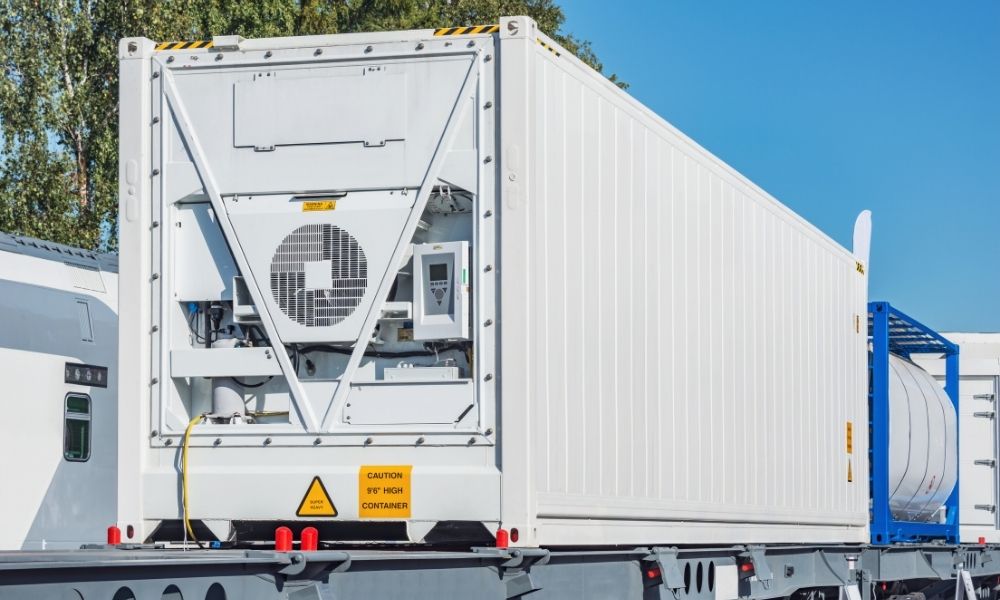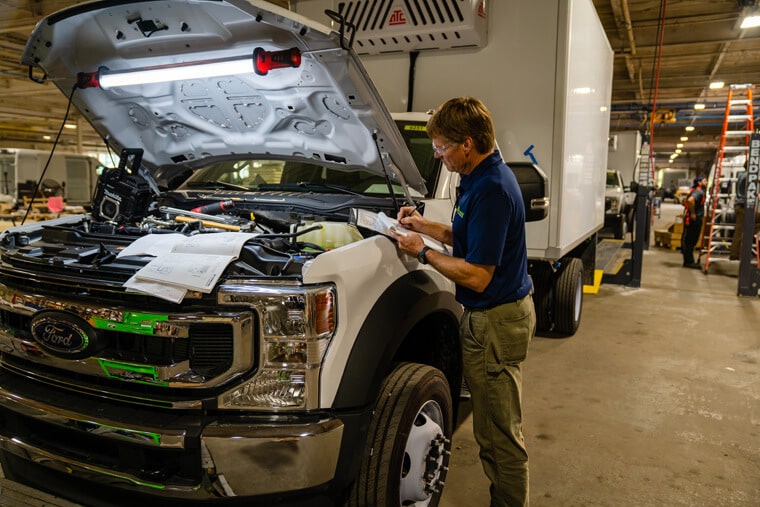
Key Tips for Maintaining Refrigerated Trucks and Freezer Vans
Joe Dickman | June 21st, 2021
Your refrigerated vehicle will be one of the most important assets you own to meet your business needs. Suppose you’re transporting products and your vehicle breaks down in an inconvenient area or is unable to properly refrigerate during the drive. In that case, it can cost you much more than if you had done preventive maintenance beforehand. That is why it is best to make sure you are routinely servicing, repairing, and maintaining vehicles to keep them well-preserved and functioning correctly. Read on for some key tips for maintaining refrigerated trucks and freezer vans.
Refrigerated Truck or Freezer Van
Before diving into maintenance tips, you may be considering purchasing one of the two for your business. Refrigerated vans and trucks are ideal for keeping your products cooled at the proper temperature. Both reefer vehicles will perform the job right, whether you are carrying products over a long distance or transferring perishable items from one location to another across town. Therefore, the decision to go with largely depends on your business and product capacity needs, but there are a few significant differences between the two.
Benefits of Refrigerated Trucks
- Refrigerated trucks have a greater carrying capacity and may carry heavier payloads than vans. A grocery store or meat packing business, for example, will often have a higher capacity requirement.
- Trucks are typically better suited to handle more rugged terrain and built to withstand constant long-distance traveling.
- Trucks offer many customization options, including outfitting different types of reefers that can cool products to varying temperatures in the same cabin, which may not be practical in vans.
Benefits of Freezer Vans
- As opposed to the large capacity of the truck, the van’s compact size allows you to access the products it is carrying more easily and quickly.
- Vans are closer to the ground, have ramps that can be fully automatic or easy to set up, and tend to have smoother insides, making it easier to load and unload products.
- Vans tend to have better fuel efficiency due to their size and because they carry smaller payloads.
- You might also consider adding a freezer van in addition to your refrigerated trucks. To prevent delays or handle unexpected overflow on a shipment, you can use the van as a fill-in.
Maintaining Refrigerated Trucks
Trucks can rack up plenty of miles quickly, especially if your transportation needs take you all over your state or across the country. Breakdowns while transporting products could cost you valuable time and money and risk the integrity of your loads. You should make sure that maintenance of your refrigerated trucks is one of your highest priorities to ensure the safety of your drivers and take precautions to preserve your products. To help prevent breakdowns on your refrigerated truck, here are some maintenance tips.
Keep the Correct Temperature
Your trailer used to move goods must keep the proper temperature required for safe transportation of your products. The driver will prevent food from rotting or contamination from germs or mold by ensuring the trailer is at the right temperature. Failing to follow the proper temperature requirements could damage the freight and compromise the trailer’s overall sanitation.
Don’t Shrug Off Minor Issues
Suppose you or your drivers notice minor problems starting to arise, such as your trailer taking a little longer to cool down properly or strange noises coming from anywhere inside or outside the truck. In that case, you should make sure you are having the vehicle inspected right away. Truck drivers can sometimes be tempted to dismiss irregularities in their truck’s performance, but these minor difficulties can quickly escalate into significant concerns. If your business relies on a refrigerated truck regularly, you should take these minor issues seriously.
Clean Your Trailer Regularly
You should make sure you are cleaning out your trailer after every shipment. Failure to do so can leave unwanted bacteria, mold, and other residues to build up after loads. This residue can cause cross-contamination with other sensitive products in your next cargo or lead to rotting and other unpleasantness that can cost you hundreds or even thousands of dollars very quickly.
- Start your cleaning process with an empty trailer.
- Although a standard multi-surface cleaning agent may suffice, try to use a heavy-duty cleaning agent if your cargo hold can withstand it and it does not interfere with your products.
- Hazardous bacteria and mold can remain on any surface, so you should make sure you are cleaning the floor, ceilings, walls, and door seals under pressure or washing.
- Use scrapers to remove more challenging spots off your truck while being careful not to accidentally scrape the interior of your vehicle.
- Once you finish, make sure the trailer has time to completely dry; otherwise, you might invite mold and bacteria to grow in the damp environment when you introduce your products.
Maintaining Freezer Vans
Preventative maintenance on your freezer vans can prevent many of the same issues as a refrigerated truck. Breakdowns on the road can have severe implications, ranging from simple matters like delayed deliveries to significant problems like rotting due to a broken cold chain. For smaller businesses, a single freezer van might be their only means of refrigerated transport, so that breakdowns can cause even more significant delays and issues. Here are some tips for maintaining your freezer van.
Schedule Routine Inspections
Newer cars and trucks can often go 100,000 miles between inspections; however, you might want to keep them close to every 25,000 miles if you are routinely driving in rougher conditions. Skilled professionals will find more minor issues that can become more serious problems if left unchecked and vital to keeping your vehicle running smoothly.
Undertake Regular Tune-Ups
Check your oil and coolant levels, and make sure your oil is clean. You should change your oil every 3000 miles (about the width of the United States) to guarantee optimal performance for your van. Freezer vans are particularly susceptible to dust and debris, impairing their capability to maintain a steady temperature. Check to ensure that no pollutants and hazardous materials have gotten into the refrigeration unit during your tune-ups.
Hopefully, these key tips for maintaining refrigerated trucks and freezer vans can help ensure your vehicles remain in excellent condition. If you are ready to add additional small refrigerated trucks or freezer vans to your fleet or business, the professionals at Emerald Transportation Solutions are here to help you. We have an extensive lineup of refrigerated vehicles to meet your needs. Feel free to contact us with any questions you may have.
Related Articles
Contact Us
Feel Free To Contact Us If You Have Any Questions
What does under DOT mean?
Questions regarding DOT requirements come up often. 10,000 lbs GVW (gross vehicle weight) and over are commercial vehicles that fall under the Department of Transportation regulatory requirements.
What is the difference between GVW and payload?
GVW or Gross Vehicle Weight is the entire weight of the vehicle including the payload. The payload weight represents the amount of cargo you are hauling.
What is a self-powered unit and a vehicle-powered unit?
A self-powered unit has its own fuel source and will run independent of the truck. This is the heaviest and most expensive option. While vehicle-powered units run off the engine via a compressor mounted on the engine. These are less expensive and lighter in weight but you must run the truck or plug the electric standby into shore power.
What does K-factor mean and why is that important?
K-factor is a term that stands for the overall insulating value of the container (truck body). Quite simply the lower the K-factor the better the truck body will be able to maintain a given temperature and require less energy to do so.
How much lighter is a Poly Van vs a US spec body?
Poly Van bodies are very light. On average we estimate we are 75-150 lbs per foot lighter than a traditional sheet and post foamed in place body. These weight savings translates to less fuel burn and less CO2 emissions, along with added payload, the most important benefit.







